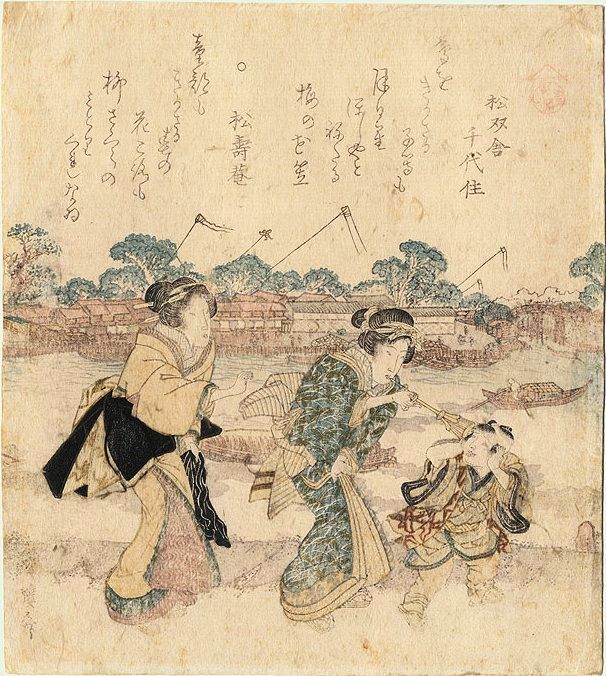| |
EISEN
|
|

"Hear no Evil"
(Kika-zaru, 聞かざる)
Surimono
Series: See no Evil, Speak no Evil and Hear
no Evil
(Mizaru, Kikazaru, Iwazaru, 見ざる, 聞かざる, 言わざる)
(published before 1848)
Comment - Surimono print of a beauty
teasing a young boy, poking at him with a small rake as he
clamps his hands to his ears to "hear no evil." Another woman
hurries behind, admonishing her companion and waving her hand
in a stopping motion. Boats can be seen on the river behind
them, with shops and a daimyo's palace lining the far shore
and four Edo-kites
("Edo-tako", "江戸凧"), and a Yakko
("奴凧, "yakko-dako") or man kite fluttering overhead.
Beautifully detailed with delicate embossing in the kimono
patterns and the rippling water, along with silver and gold
mica. An intriguing design, also to be seen in several world
known museums.
Surimono - Surimonos are an exclusive subcategory of Japanese woodblock prints. Poetry clubs or other kind of cultural societies commissioned these designs for distribution to a small audience of members, most often as New Year's greetings. These privately published images included a wonderful range of subjects and lavish printing techniques such as embossing, burnishing, and metallic pigments. Since surimono were not sold commercially, the print runs were very small and original Edo era surimono are incredibly rare.
This surimono is one out of three from a series that illustrates the common proverb "Hear no Evil", "Speak no Evil", "See no Evil", often depicted with the "Wise Three Monkeys". There is a comparable series made by Ryûryûkyo Shinsai, from (1810 - 1825).
Series - See no Evil, Speak no Evil and Hear no Evil (Mizaru, Kikazaru, Iwazaru, 見ざる, 聞かざる, 言わざる)
Artist - see Biography
Signature - none (Surimono); small seal on reverse
Publisher - small stylized seal on reverse reading Tadayoshi (忠喜) (exlibris, publisher?)
Image Size - 20.6 x 18.4 cm (8 1/8" x 7 1/4")
Condition - single sheet, nishiki-e (cloured woodblock); Surimono; ink, color, metallic pigment and embossing on paper.
Surimono - Surimonos are an exclusive subcategory of Japanese woodblock prints. Poetry clubs or other kind of cultural societies commissioned these designs for distribution to a small audience of members, most often as New Year's greetings. These privately published images included a wonderful range of subjects and lavish printing techniques such as embossing, burnishing, and metallic pigments. Since surimono were not sold commercially, the print runs were very small and original Edo era surimono are incredibly rare.
This surimono is one out of three from a series that illustrates the common proverb "Hear no Evil", "Speak no Evil", "See no Evil", often depicted with the "Wise Three Monkeys". There is a comparable series made by Ryûryûkyo Shinsai, from (1810 - 1825).
Series - See no Evil, Speak no Evil and Hear no Evil (Mizaru, Kikazaru, Iwazaru, 見ざる, 聞かざる, 言わざる)
Artist - see Biography
Signature - none (Surimono); small seal on reverse
Publisher - small stylized seal on reverse reading Tadayoshi (忠喜) (exlibris, publisher?)
Image Size - 20.6 x 18.4 cm (8 1/8" x 7 1/4")
Condition - single sheet, nishiki-e (cloured woodblock); Surimono; ink, color, metallic pigment and embossing on paper.
Copyright 2008 ff: Hans P. Boehme